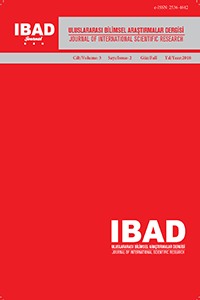Öz
Islam as a religion embraces human being in a
broad frame. According to this, human being has several significant
characteristics inside; in other words, human being is a small model of the
universe.
According to Islam, one of the reasons why
human beings were sent to the world is to make the world beautiful and liveable
instead of making the world uninhabitable and wasted.
In Islamic economic approach, human beings
possess moral values and these values are effective in all their economic
decisions. In this respect, not everyone thinks only of herself / himself. S/he
thinks about the interests and prosperity of the whole society. S/he is not
selfish, is a sharer and fair-minded. If it is necessary, s/he firstly
considers interest and prosperity of the society instead of her/himself.
A Muslim meets the needs and evaluates
her/his interests until the end. But s/he does so within the framework of the
commandments and prohibitions of Allah/God, with regarding reasonable measures.
To sum up, Islam determines limits needs of human being of Islam on the way of
being “Homo Islamicus”.
In this article,
unlike the Western economic approach, which regards the concept of
limitlessness of needs as the fundamental axis in the name of "individual
freedom", the main approaches of Islam on need will be addressed.
Anahtar Kelimeler
Kaynakça
- ASUTAY, Mehmet (2007). “A Political Economy Approach to Islamic Economics: Systemic Understanding For An Alternative Economic System”. Kyoto Bulletin of Islamic Area Studies. 1(2).CHAPRA, Ömer; Ahmed, Hurşid; Yılmaz, Faruk ve Şah, Abdurrahman (1991). İslam Ekonomisi ve Sosyal Güvenlik Sistemi. Hazırlayan: Faruk Yılmaz. İstanbul: Marifet Yayınları.ÇOBANOĞLU, Şevki (2013). İslam Ekonomisi. İstanbul: Yediveren Yayınları.DİLEK, Serkan; Küçük, Orhan; Işık, Sefa ve Çakmak, Fatih (2017-1), “İsraf ve Tüketici Dengesine Yeni Bir Yaklaşım”, International Congress On Political, Economic and Social Studies, 19-22 May 2017, Sarajevo.DİLEK, Serkan; Küçük, Orhan; Özdirek, Recep (2017-2). “Homo Economicus Mu? İslami İnsan mı?” Uluslar arası Ekonomik Araştırmalar Dergisi, ss. 635-641.EBUSSUUD, Mahmud (1983), İslâmî İktisad’ın Esasları, Trc. Ali Özek, İstanbul: Hisar YayıneviGÖRMÜŞ, Şakir (2015). “İslam İktisadı, İnsanlık İçin Bir İhtiyaç mı?”. International Journal of Islamic Economics and Finance Studies. 1(2). ss. 161-170.HOESCHELE, Wolfgang (2010). The Economics of Abundance: A Political Economy of Freedom, Equity and Sustainability. England: Gower Publishing Limited.SİLİ, Ayşegül; Çürük, Suna A. (2013/2). “Bir İdeal Toplum Bileşeni Olarak İslam’ın Temel Ekonomik İlkeleri.” Ekonomik, Toplumsal ve Siyasal Analiz Dergisi, Maltepe Üniversitesi Yayınları, ss. 107-123.TABAKOĞLU, Ahmet (1987). İslâm ve Ekonomik Hayat. İstanbul: Diyanet İşleri Başkanlığı YayınlarıTABAKOĞLU, Ahmet (2005). İslâm İktisadı – Toplu Makaleler II. Kitabevi Yayınları, İstanbul.TABAKOĞLU, Ahmet (2013). İslâm İktisadına Giriş. Dergâh Yayınları, İstanbul.ZAİM, Sabahaddin (1992), İslâm-İnsan, Ekonomi. İstanbul: Yeni Asya Yayınları
Öz
İslam dini insanı geniş bir çerçevede ele
alır. Buna göre insan, birçok önemli özelliği bünyesinde barındırır, bir bakıma
kâinatın küçük bir modelidir.
İslam’a göre insanın dünyaya gönderilme
sebeplerinden birisi dünyanın güzel ve yaşanabilir hale getirilmesidir;
dünyanın ziyan edilmesi, yaşanmaz bir hale getirilmesi değildir.
İslam iktisadi yaklaşımında insan, ahlakî
değerlere sahiptir ve bu değerler onun tüm ekonomik kararlarında etkili olur.
Bu açıdan her birey sadece kendini düşünmez. Bütün toplumun menfaatini ve
refahını düşünür. Bencil değildir paylaşımcı ve adildir. Yeri geldiğinde toplum
menfaati ve refahını kendisinden önce düşünür.
İslam insanı ihtiyaçlarını karşılar ve
menfaatlerini sonuna kadar değerlendirir. Fakat bunu Allah’ın emir ve yasakları
çerçevesinde, makul ölçüleri gözeterek gerçekleştirir. Kısacası İslam insanının
ihtiyaçlarına “İslam insanı” olma yolunda sınırlar konulur.
Bu makalede,
“bireysel özgürlük” adına ihtiyaçların sınırsızlığı anlayışını temel eksen
olarak kabul eden Batılı iktisadi yaklaşımdan farklı olarak, İslam’ın ihtiyaç
konusundaki temel yaklaşımları ele alınacaktır.
Anahtar Kelimeler
Kaynakça
- ASUTAY, Mehmet (2007). “A Political Economy Approach to Islamic Economics: Systemic Understanding For An Alternative Economic System”. Kyoto Bulletin of Islamic Area Studies. 1(2).CHAPRA, Ömer; Ahmed, Hurşid; Yılmaz, Faruk ve Şah, Abdurrahman (1991). İslam Ekonomisi ve Sosyal Güvenlik Sistemi. Hazırlayan: Faruk Yılmaz. İstanbul: Marifet Yayınları.ÇOBANOĞLU, Şevki (2013). İslam Ekonomisi. İstanbul: Yediveren Yayınları.DİLEK, Serkan; Küçük, Orhan; Işık, Sefa ve Çakmak, Fatih (2017-1), “İsraf ve Tüketici Dengesine Yeni Bir Yaklaşım”, International Congress On Political, Economic and Social Studies, 19-22 May 2017, Sarajevo.DİLEK, Serkan; Küçük, Orhan; Özdirek, Recep (2017-2). “Homo Economicus Mu? İslami İnsan mı?” Uluslar arası Ekonomik Araştırmalar Dergisi, ss. 635-641.EBUSSUUD, Mahmud (1983), İslâmî İktisad’ın Esasları, Trc. Ali Özek, İstanbul: Hisar YayıneviGÖRMÜŞ, Şakir (2015). “İslam İktisadı, İnsanlık İçin Bir İhtiyaç mı?”. International Journal of Islamic Economics and Finance Studies. 1(2). ss. 161-170.HOESCHELE, Wolfgang (2010). The Economics of Abundance: A Political Economy of Freedom, Equity and Sustainability. England: Gower Publishing Limited.SİLİ, Ayşegül; Çürük, Suna A. (2013/2). “Bir İdeal Toplum Bileşeni Olarak İslam’ın Temel Ekonomik İlkeleri.” Ekonomik, Toplumsal ve Siyasal Analiz Dergisi, Maltepe Üniversitesi Yayınları, ss. 107-123.TABAKOĞLU, Ahmet (1987). İslâm ve Ekonomik Hayat. İstanbul: Diyanet İşleri Başkanlığı YayınlarıTABAKOĞLU, Ahmet (2005). İslâm İktisadı – Toplu Makaleler II. Kitabevi Yayınları, İstanbul.TABAKOĞLU, Ahmet (2013). İslâm İktisadına Giriş. Dergâh Yayınları, İstanbul.ZAİM, Sabahaddin (1992), İslâm-İnsan, Ekonomi. İstanbul: Yeni Asya Yayınları
Ayrıntılar
| Birincil Dil | Türkçe |
|---|---|
| Bölüm | Makaleler |
| Yazarlar | |
| Yayımlanma Tarihi | 30 Aralık 2018 |
| Yayımlandığı Sayı | Yıl 2018 Cilt: 3 Sayı: 2 |
Kaynak Göster
Cited By
A Solution to Waste Economy and Water Scarcity; Air Conditioning Wastewater
Black Sea Journal of Engineering and Science
https://doi.org/10.34248/bsengineering.1557501
IBAD Sosyal Bilimler Dergisi / IBAD Journal of Social Sciences / IBAD
IBAD, EBSCO, SCOPUS, E-SCI ve TÜBİTAK/ULAKBİM(TR) SBVT tarafından DİZİNLENMEK ÜZERE değerlendirme sürecindedir.
Dergimizin sekreterya ve dizin/indeks takibi işlemleri dergieditoru.com tarafından yürütülmektedir.


